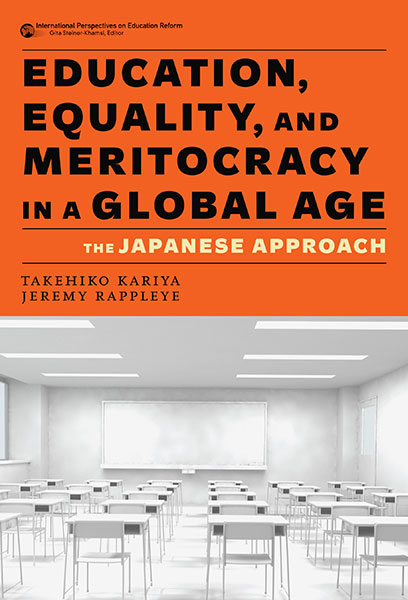Professors: Request an Exam Copy
Print copies available for US orders only. For orders outside the US, see our international distributors.
Takehiko Kariya, Jeremy Rappleye
Publication Date: June 19, 2020
Pages: 240
Series: International Perspectives on Educational Reform Series

How has schooling functioned in the construction of meritocratic national systems historically? To what extent will these historical patterns and normative commitments continue in the new era of a global meritocracy? And ultimately, how can educators effectively balance the inherent tension between individual merit and standardized quality? Kariya and Rappleye explore the answers to these questions and more by focusing on the Japanese model, long recognized globally for being one of the most equitable and meritocratic systems in the world. Looking at the country’s educational history and policy shifts, the authors point to the important comparative lessons for sociology and education research. They show how the Japanese experience can inform global approaches to educational reform and policymaking —and how this kind of exploration can reinvigorate a more rigorous discussion of meritocracy, equality, and education.
Book Features:
This book is made available as an open-access electronic publication with the generous support of the Suntory Foundation.
Takehiko Kariya is Professor in the Sociology of Japanese Society at University of Oxford. Jeremy Rappleye is an associate professor at Kyoto University.
“Kariya and Rappleye aim to reassess educational equality in Japan and to contribute to global debates by their re-evaluation of the significance of the Japanese case. Their book contains fascinating revelations that should prompt careful thought about forms of equality and the mechanisms behind them. It also makes a provocative assessment of educational reforms in contemporary Japan, which raises many questions.”
—The Journal of Japanese Studies
“The book makes a significant academic contribution by presenting the possibility of a new approach to analyzing meritocracy, a key concept in the debate on the realization of societal equality through education, in its reevaluation of the Japanese case.”
—Teachers College Record
“Meritocracy. Equality. These are ideals that democratic societies have championed and continue to champion. How can Japan’s construction of linkages between meritocracy, equality, and education in the second half of the 20th century and beyond be characterized? This volume answers this question by providing a deep historical examination of the successes, ironies, and contradictions of Japan’s particular brand of meritocracy.”
—Mary C. Brinton, Reischauer Institute Professor of Sociology, Harvard University
“This important book reveals that the vaunted egalitarianism of the contemporary Japanese education system is not a reflection of an entrenched cultural tradition in Japan, but an unexpected outcome of a historical contingency of postwar Japanese policymaking that was shaped by a specific understanding of ‘equality’ and the logic of resource allocation of the time. Grounded in sociology of knowledge, the rich empirical analysis of the evolution of the myth of equality makes this book a must-read for those interested in how meritocracy, equality, and education intersected in Japan to produce a model for ‘a global meritocracy.’”
—Kiyoteru Tsutsui, professor of sociology and director of the Japan Program at the Shorenstein Asia-Pacific Research Center, Stanford University
“Education, Equality, and Meritocracy in a Global Age makes an important contribution to the literature on education in Japan. Its authors, Takehiko Kariya and Jeremy Rappleye, explore the deeper structural elements that undergird current debates about education reform in Japan. Their rigorous analysis of documents not previously examined in the English literature challenges us to rethink our assumptions about concepts such as meritocracy, individualism, and educational opportunity. This book should appeal to Japan specialists, as well as readers interested in global approaches to educational reform and policymaking.”
—Christopher Bjork, Professor of Education on the Dexter M. Ferry, Jr. Chair, Vassar College
“This book is a significant historical work discussing the ways in which the Japanese government set up programs and policies to address educational gaps pre- and postwar, called ‘surface equality,’ in collaboration with prefectures, teachers, and the union. It reprimands those who have settled for mythologies, moving us to acknowledge the tensions between equality and freedom and offering a third way.”
—June A. Gordon, professor, University of California, Santa Cruz
Contents (Tentative)
1. Introduction: Rethinking Education and Equality in an Era of Inequality
Toward a Global Meritocracy? A Brief History of an Ideal
A Meritocratic Utopia? The Importance of Japan in the Discussion
Purpose and Aims of the Book
Outline of Chapters
2. The Japanese Story: Topography of Confrontation, Roots of the Problem
The Story Begins: Why 1958?
Why the Late 50s?
The Meaning of ‘Reverse Course’
The Great 6-3 Experiment
Excavating the Problem: Descending Beyond Left/Right Confrontation
3. The Traumatic Prewar Legacy and the Roots of the American Model
Prewar Allocation of Education Resources
How to Solve the Problem
American Roots: the Scientific-Management Revolution
Individualization of Learning and the Logic of Educational Finance
4. Drafting the Postwar Blueprint
Beginning Again Postwar
Postwar Demands
World of Standard Means: the Japanese Approach to Equality
5. The Unknown Revolution: “Surface Equality”
Educational Finance Trends and Interregional Inequalities
The Silent Revolution’: Homogenization of Educational Provision
“Surface Equality”: Towards Greater Homogenization
6. The Ambivalence of Standardization
National Survey of Academic Achievement: A Reanalysis
Connections to Achievement
Surface Equality and Ambivalence: Homeroom, Collective Order, and Exam Competition
7. The Whereabouts of “Surface Equality” Today
Dismantling the World of Standardization? Policy Reforms 1995–2010
The Silent Growth of Inequalities
The Ease of Understanding the Object of Critique
Inflected Perspectives: The Optical Illusion of Individuality and Individualism
8. Conclusion: Drawing the Implications for a Global Age
Japan in the Global Conversation: Still the Meritocracy Frontier?
Revisiting Michael Young’s Dystopia
Education and Equality 30 Years after Neoliberalism
References
Index
About the Authors
Professors: Request an Exam Copy
Print copies available for US orders only. For orders outside the US, see our international distributors.